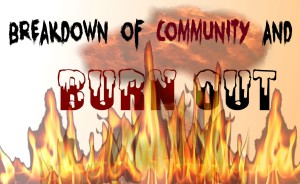
Hospitals, large provider groups and clinics each represent, in and of themselves, a community. The strength of these organizations is derived from the strength of the interpersonal relationships formed within each. If a provider community is thriving, the interpersonal relationship bonds are strong within the community. Where ever and whenever the sense of community breaks down, you will find burned out employees.
Recently I began reviewing the 6 mismatches between the job and the individual which can lead to burnout and writing about them in a series. The fourth mismatch in this series, breakdown of community, is the subject of this particular post.
Interpersonal relationships are a fundamental component of community within an organization. Of all the reasons people look forward to going to work, the anticipated interaction with fellow employees ranks high on the list. This makes the workplace a more interesting place, fosters teamwork and provides a platform for mutual support.
As organizations grow ever larger or too quickly, a breakdown in the character of the organization can result if short-term profitability is chased at the expense of interpersonal relationships. In other words, the heart-and-soul of the organization gets lost or left behind. This can lead to greater conflicts among employees, a lack of mutual support, lack of respect and a growing sense of isolation.
Sad to say, in some organizations employees can become so isolated they may know little or nothing about the professional and personal lives of their fellow coworkers even three or four cubicles over. Let alone one or two floors up or down.
Where employee turnover is high, whether due to cost cutting measures or a poor work environment, job security is eroded. Without job security, tight interpersonal relationships can not be formed or the synergy of an integrated work group can not be maintained. Any sense of community becomes lost.
In her book, The Truth About Burnout, Dr. Christina Maslach states, “A sense of belonging disappears when people work separately instead of together.” In the presence of growing isolation you will find the absence of a sense of community.
The meme, “we are all in this together” is replaced by, “it’s every man and women for themselves”. I ask you, how good a product or service can you produce if this is the prevailing attitude within your organization? How fond would you be of your work place if everyday seemed adversarial to you in some way?
Here are 7 reasons why breakdown of community will either ruin your business or burn you out:
- Creates conflict.
- Undermines teamwork.
- Communication breaks down.
- The sense of belonging disappears.
- Loss of support and respect.
- Growing sense of isolation.
- Loss of job security.
All of this serves to dilute the energy within an organization because workers end up cross purposes or at odds with one another. Conflict takes time and soaks up valuable resources even as the workforce becomes less and less productive. Products and services ultimately suffer.
Many positive steps can be taken in order to repair a damaged sense of community or to create a sense of community where none yet exists. It requires making the work environment conducive to building interpersonal relationships among the employees.
I will be writing more on how to accomplish this in future posts. Please, come back here for the next post in this series on the job-employee mismatches leading to burnout and what to do about them.
In the meantime, do you feel a sense of community in your current work environment? If not, why not? Do you feel community is something which could be strengthened to the benefit of your organization and to you personally? What change would make the biggest difference in creating a stronger sense of community in your workplace?